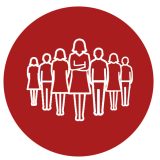Lack of campaigns to make women’s research more visible. The contribution of women to research was not systematically communicated.
Initiatives that raise awareness of women’s contribution to research: a database of publications by gender in Portugal
Problem (evidence)
Aims/objectives
To make women´s research contribution more visible.
Resources
The dissemination within the institution received support from the different services in the institution.
Brief outcomes
The dissemination and publications (open source) about research production by gender has short and long term impact since the scientific community will be able to use, update and extend the big database of what created.
Additional and unique information *by gender* is available open source and is a relevant contribution to the improvement of research.
Key area
Recruitment, career progression and retention
Type of action
Organization
Lisbon School of Economics and Management (ISEG)
Higher education institution
Action level of implementation
Researchers/professors and technical and administrative staff, students
Implementation
The first step was collecting bibliometric information about research in all scientific fields published by researchers affiliated to Portuguese institutions for the last decade. The second step was to identify separately, using an original algorithm, the gender of authors of each publication. Finally, a database of the results was created to disseminate information regarding research production by women and men in all the scientific fields. The new database will be available for all the scientific community to explored and use in Portugal or abroad.
To enhance the of visibility of women’s contribution to research, the ISEG PLOTINA team contributed to events within the institution (seminars, workshops, conferences) and beyond. For example, sister project GERI or Horizon 2020 events such as SAGE (Portuguese partner: IUL), GEARING ROLES (Portuguese partner: IGOT). RELOCAL, a h2020 project, focuses on issues of spatial justice and territorial cohesion, mainly on local and community-based development models. (Portuguese partner: ISEG) co-organize with PLOTINA in 22 January 2020 in ISEG a workshop (“Women as agents of local transformation”).
The material used in the dissemination is available in open source in the web. This action also contributed to the Case Study of ISEG (Mapping Gender in Research: the case of Portugal) provide original and good material that allow good ‘campaigns’.
Tips/strategies – Lessons learnt
Design rigorously and well in advance the plan of dissemination where possible.
More detailed Outcomes/Impact
Stereotypes about women in research will be discussed based on evidence.
In February 2019, the Gender Taskforce team published a Statement with regards to an incident that took place in Warwick University, which included sexist comments.
Reflection: what we would do differently
Start the process of collecting and requesting data early on.
More emphasis on raising awareness of the database across the scientific community and general public with the use of online social media and traditional media. Promoting and disseminating these events can be improved with more institutional channels. There is no newsletter, however all the events were announced on institutional webpages and social media.


